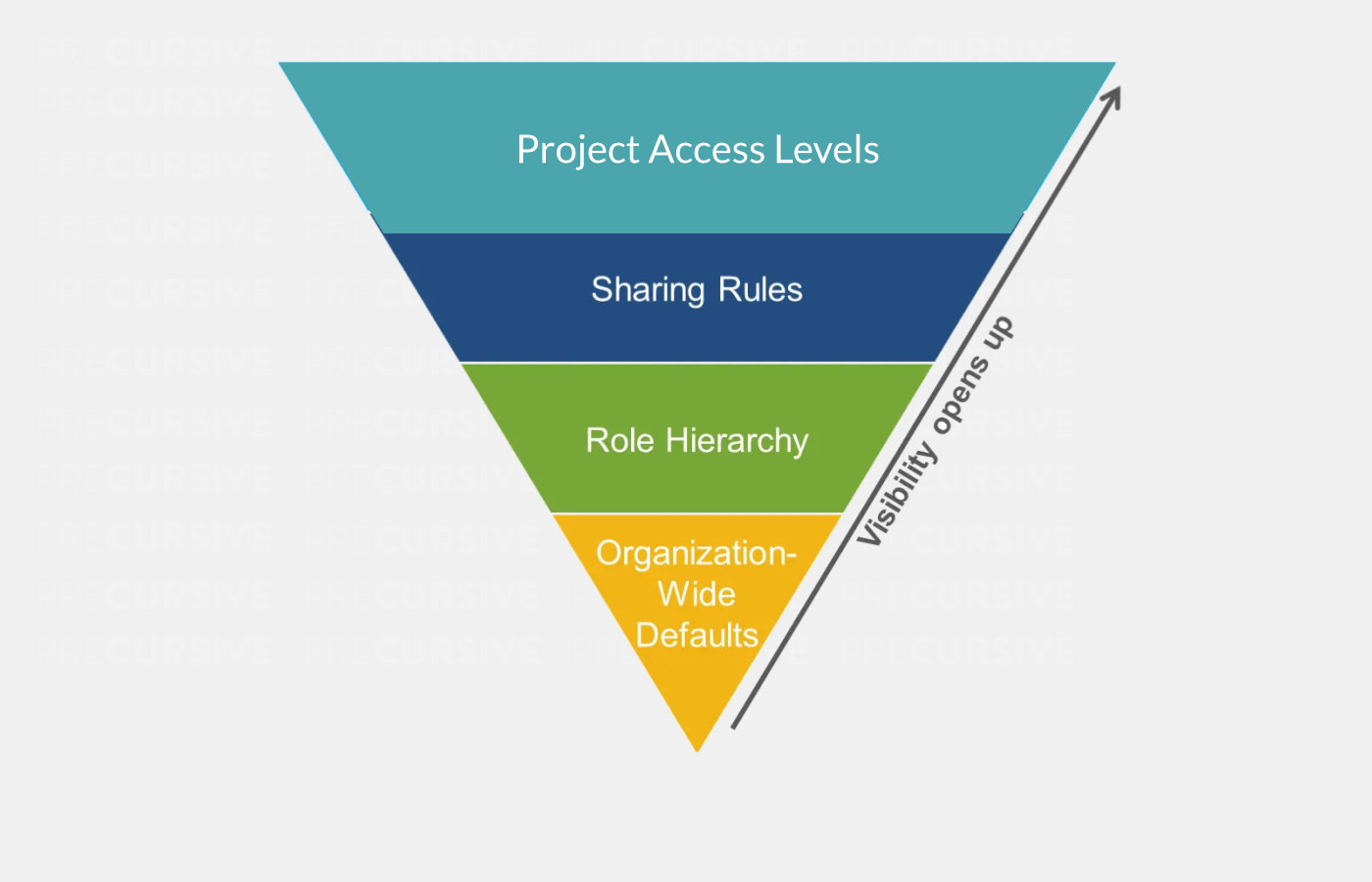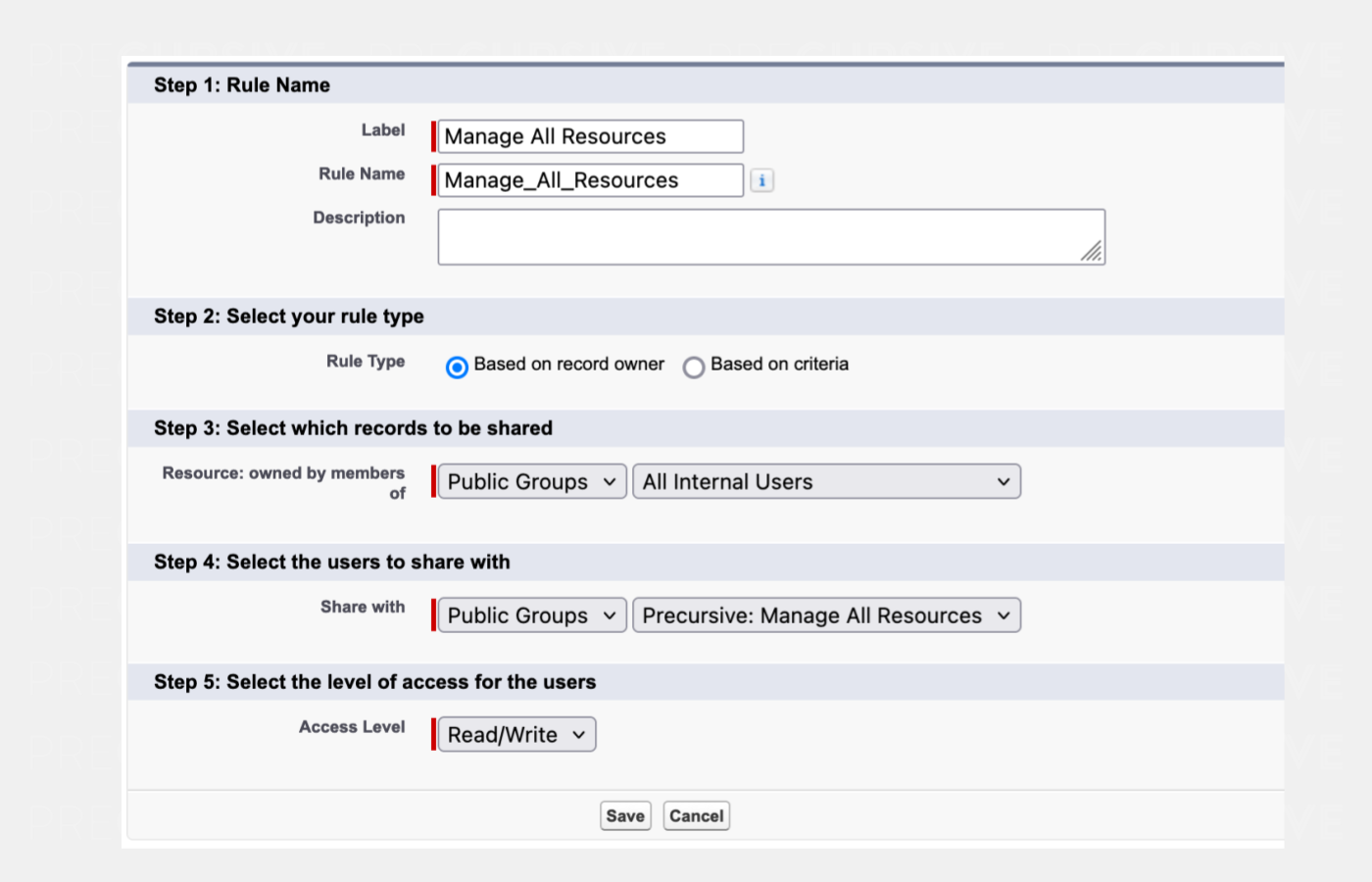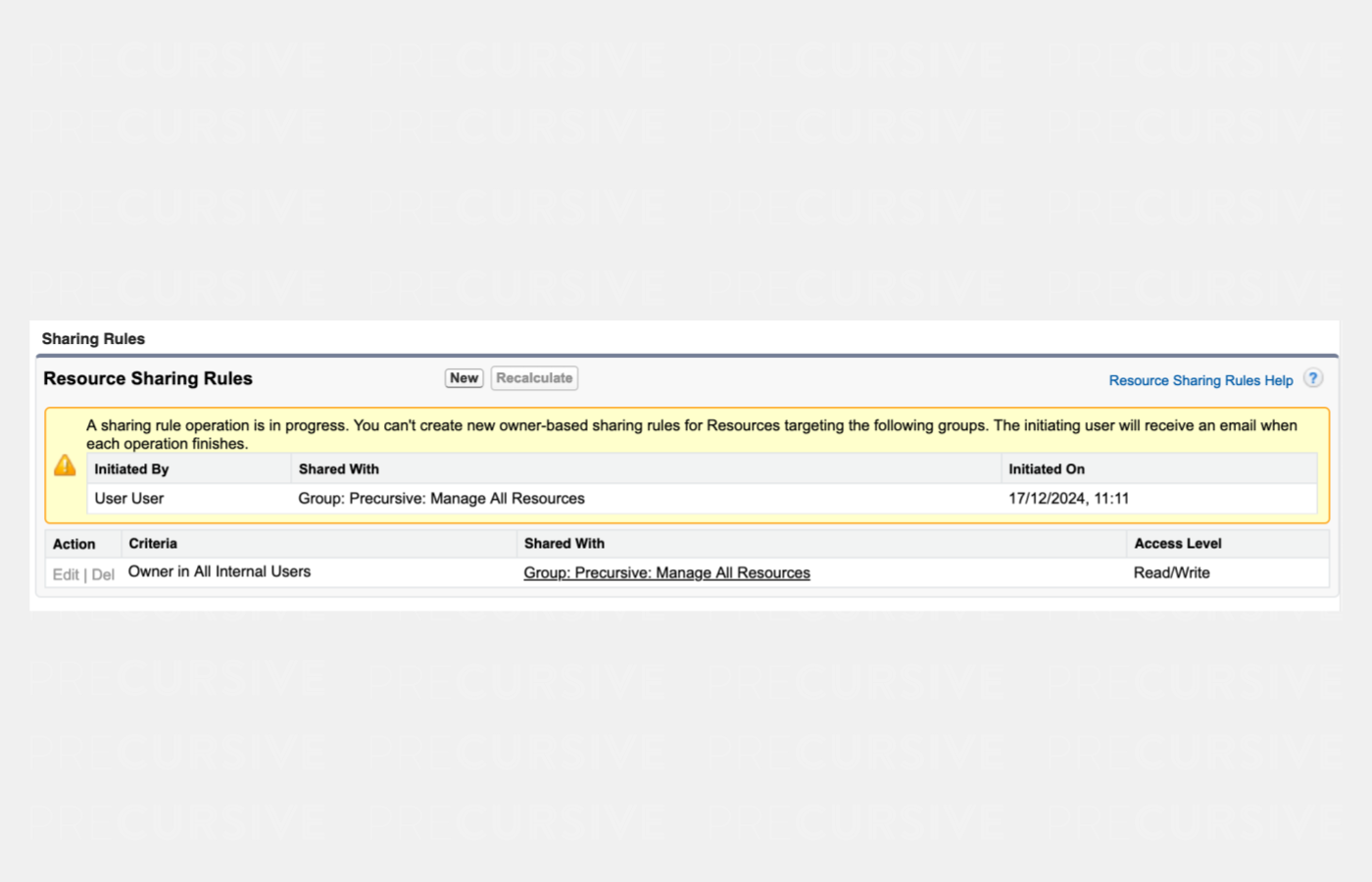To upgrade from Custom User Settings to Project Access Levels and achieve greater flexibility and more precise management of Project-related data access, learn how to upgrade to Project Access Levels.
What is a Private Sharing Model?
The Salesforce Sharing Model enables records to be set as Public Read/Write, Public Read-only, or Private. In a Private setting, users can only access records they own unless explicit permissions are granted.
Sharing Organization-Wide Defaults (OWD)
OWD defines the baseline level of visibility and permissions for records across your organization.
Here’s a breakdown of the three Sharing Settings for OWDs:
-
Public Read/Write: All users can view and edit all records.
-
Public Read-only: All users can view records, but only owners or those with permissions can edit. (Recommended for Precursive objects.)
-
Private: Only owners or explicitly shared users can access records. Ideal for businesses with high-security needs or multiple units sharing the same Precursive instance.
Sharing Records beyond Organization-Wide Defaults (OWD)
Expand record access through the following methods:
Ownership-Based Access
Record owners and their queues have default access to projects and related records.
Role Hierarchy
The role hierarchy grants users access to records owned by users below them in the hierarchy, ensuring managers and higher-level roles have visibility and control over their team’s data.
Sharing Rules
Customers can define additional sharing rules to extend access to specific records. Sharing Rules can be configured based on Ownership or Record Criteria. Learn more about Sharing Rules.
Project Access Levels (PALs)
Project Access Levels are how Precursive provides a flexible layer on top of the Salesforce Sharing Model. Project Access Levels (PALs) are a set of Project, Phase and Task permissions that define access for each Participant.

Learn more about Salesforce Sharing and Record Access Features.
Project Access Levels (PALs)
Project Access Levels (PALs) are a set of Project, Phase and Task permissions that define access for each Participant. PALs are assigned to Participants to define their level of access to the Project and Phase.
PAL Permissions Overview
The following Permissions can be defined on a Project Access Level record. Each Permission will grant access as follows:
|
Permission
|
Description
|
|
Manage Project
|
Edit Project and Project-level records (not included: All Phases, All Tasks).
|
|
Manage Phase
|
Edit Phase and Phase-level records (not included: All Tasks).
|
|
Manage Participants
|
Granting this option will allow Participants to manage other Participants assigned to the same Phase.
|
|
View Phase
|
Read Phase-related details with read-only access to all the dependent objects.
|
|
Manage All Tasks
|
Edit all Tasks in the Phase, including edit access to all Tasks-dependent records.
|
|
View All Tasks
|
Read all Tasks in the Phase, including read-only access to all Tasks-dependent records.
|
|
Manage My Tasks
|
Edit Tasks that are assigned to that Contributor, including edit access to these Tasks-dependent records.
|
|
Manage All Timesheets
|
Edit all Participants Timesheets.
|
|
View All Timesheets
|
View all Participants Timesheets.
|
|
Manage All Expenses
|
Edit all Expenses on the Phase.
|
|
View All Expenses
|
Read all Expenses on the Phase.
|
|
Submit Expenses
|
Create and submit Expenses on the Phase
|
|
Submit Time
|
Log Time and Submit their Timesheets on the Phase this Participant is assigned to.
|
Assigning Project Access Levels
PALs can be assigned to each individual Participant to define their level of access to the Project and Phase. To allow organizations to control Project Access Levels at scale PALs can be assigned as an org-wide default or as a Role default. When adding a Participant the PAL related to the Role will be used by default, or the org-wide will be used. When setting default Project Access Level org-wide or by role you will have two options:
NOTE: Assigning a Project Access Level to a Role will only impact Participants created or assigned from the point of assignment. It will not assign a Project Access Level to all Participants with that Role.
Org-wide Default Project Access Level
Once you have created a Project Access Level, visit Precursive HQ > Project Settings. Set the Project Access Level as the Default Internal Project Access Level and Default External Project Access Level.
Role Default Project Access Level
For each Role, it is recommended to establish default Project Access Levels. To do this, first create a Project Access Level for each Role (or grouped Roles as needed), and then assign the appropriate access levels to each Role.
Navigate to Precursive HQ > Roles and while editing individual Role or creating new one provide a Project Access Level as the Internal or External Project Access Level.
Note: If these options are not visible on the Role Page Layout, contact your System Administrator to ensure these fields are added.
Create a Project Access Level
Steps to Create a PAL:
-
To create a Project Access Level navigate to Precursive HQ and find Project Access Level
-
Select New and provide and Name and define the Permissions.
-
Finally select Save.
-
The Project Access Level can now be assigned to a Role or Participant.
Enable Private Sharing Settings
To enable a Public Read-only or Private Sharing Model from Public Read-write you will need to follow the following actions:
-
Configure OWD for Precursive objects
-
Define your Project Access Levels
-
Assign Project Access Levels to existing Participants
Default Sharing Access Rules
When OWD is set as Public Read-only or Private for Precursive Objects then the following behaviour and sharing will be automatically applied:
|
Resource Supervisor
|
|
|
Project Owner
|
|
|
Phase Owner
|
|
|
Participants
|
-
Participants assigned to a Phase even without a PAL will be given read access to the Project, Phase, Lists, and Task Categories.
|
Record Ownership
To control access to records Precursive maintains record Ownership for the following Objects. The Owner of these records is the Resource User. If the Resource does not have a User then the Resource Supervisor will be the Record Owner.
-
Resource
-
Timesheet
-
Expenses
-
Availability
-
Utilization
-
Holiday Allowance
-
Holiday Request
Sharing Rules
When enabling Private sharing settings access to Projects and/or Resources then visibility and access will be locked down based on Ownership, Role Hierarchy, and Project Access Levels (PALs). You may have groups of users that should have access to view and edit Resources, Projects, and Timesheets that may not be the Resources Supervisor or may not be assigned to the specific Projects to be granted access through PALs. Access for these groups can be granted using Sharing Rules.
NOTE: Sharing Rules can only be created by a Salesforce Administrator.
Cascading Access to Related Records
When sharing records in Precursive, it’s important to understand how access cascades—or does not cascade—to related records. Whether access propagates depends on the relationship type between the parent and child objects:
Relationship Types:
-
Master-Detail Relationships
-
Lookup Relationships
-
Related records do not automatically inherit access when the parent record is shared.
-
Example: Sharing a Project does not automatically share its associated Phases, Tasks, Health, or Insights.
Because Lookup Relationships do not cascade access, creating sharing rules for one object often requires corresponding sharing rules for its related objects.
Here is the simplified objects hierarchy that can be used to create these Sharing Rules. This does not include objects in Master-Details relationship.
Resource
Project
-
Phase
-
Expense
-
Expense Category
-
Insight
-
Invoice Phase
-
List
-
Milestone Progress
-
Phase Milestone
-
Project Budget
-
Project Task
-
Task Category
-
Template Import History
-
Project Milestone
In case more detailed overview will be needed, use the Precursive Data Model to identify the relationship types for each object.
Examples of Sharing Rules
Allow Edit for all Resources
To grant access to Resources you can create a Sharing Rule. This will only grant access to the Resource record. Should you want to grant access to related records you may want to additionally create similar sharing rules for “Availability”, “Utilization”, “Holiday Allowance”, and "Holiday Request"
-
Create a Public Group called “Precursive: Manage All Resources” and include the appropriate Users
-
Create a Sharing Rule
-
Navigate to Setup > Sharing Settings
-
From the picklist “*Manage sharing settings for” choose “Resource”
-
Scroll down to the “Resource Sharing Rules” section and select “New”
-
Step 1: Rule Name
-
Step 2: Select your rule type
-
Step 3: Select which records to be shared:
-
Step 4: Select the users to share with
-
Step 5: Select the level of access for the users
-
Select Save

-
Sharing Rules are not effective immediately. While the Sharing Rule is being calculated you will see this message explaining a sharing rule operation is in progress.

Troubleshooting Sharing
There may be situations where you are unsure why someone does or does not have access to a specific record. In this scenario you can use the “Sharing” button available on all Objects (if you do not see it you may need your Salesforce Admin to add this button to the Page Layout or Lightning Page).
Find reason a User has access to a record
-
Navigate to the record
-
Select the “Sharing” button from the record header
-
Then select “Edit”
-
Then select “View Sharing Hierarchy”, this will list all users with access to the record.
-
Find the User from the list and select View in the User Access Details column
-
The “Reason for Access” column will describe the Sharing Rule or Sharing Reason that grants the User access to this record.
Manually Trigger Project Access Level Sharing Calculations
If there are scenarios where Project Access Level Sharing is not automatically re-calculated. These scenarios will require re-calculation of all Project Access Level Sharing.
Scenarios where Project Access Level Sharing are not automatically re-calculated:
-
When first enabling Public Read-only or Private Sharing
-
When changing Project Access Level Permissions
-
Change to Resource Supervisor
To manually trigger Project Access Level Sharing Calculations navigate to Precursive HQ > System Settings > Background Processes > Calculate Shares tile.
Resources



